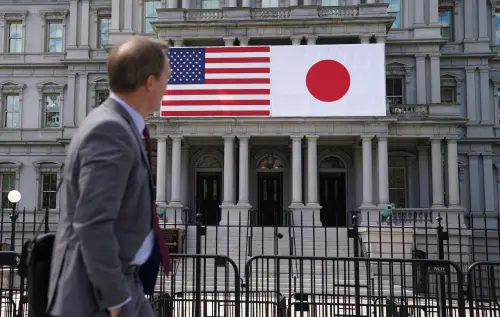This article, by Takashi Kitazume of The Japan Times, highlights a presentation given by Jing Huang at a symposium in Tokyo.
Leaders of both Japan and China have been “hijacked” by nationalistic sentiments at home and are unable even to talk to each other, a U.S. think tank expert told a recent symposium in Tokyo, as he urged the two countries to resume top-level dialogue.
Jing Huang, a senior foreign policy studies fellow at Brookings Institution, also said the United States is increasingly frustrated with Japan, its key Asian ally, over its troubled ties with China because Washington has no choice but to engage Beijing on international affairs.
Huang spoke on Dec. 5 at a symposium at Keidanren Kaikan, on the theme, “Sino-Japanese tensions and the U.S. approach.” The event was organized by Keizai Koho Center.
Despite their deepening economic and trade ties, political relations between Japan and China plunged this year to what Chinese officials described as the “lowest point” since Tokyo and Beijing normalized ties in 1972.
Mutual visits of top leaders have been suspended since 2001 as China protested Prime Minister Junichiro Koizumi’s repeated visits to Yasukuni Shrine—which many of Japan’s neighbors see as a symbol of its militarist past.
Huang said that while the history issue is the foremost cause of the current Sino-Japanese tensions, it is by no means the only irritant.
Simply No Trust
“Although both leaders in Tokyo and Beijing realize there is a huge common interest, they simply do not trust each other and are suspicious of each other, especially when Koizumi visits Yasukuni while the Chinese leaders play the nationalism card,” said the expert on Chinese politics and its relations with the U.S.
Huang cited the rise of nationalism in both China and Japan as a key factor that has complicated bilateral ties.
He said nationalism in China has negative and positive roots—the country’s sufferings in the hands of Western imperialist powers and Japan from the 1840s to the end of World War II, and its newly-found confidence and pride in the nation’s rapid development over the past 20 years.
The problem, he noted, is that Chinese Communist leadership’s propaganda campaigns have been using those two roots to reinforce each other, creating a “counterproductive” rise of nationalism peppered with a strong anti-Japanese sentiment.
Huang said he has also witnessed the rise of nationalism in Japan—for different reasons.
On one hand, he argued, is the concern that Japan’s power and influence may have peaked and is on decline, while China is rising.
On the other hand, Japan feels it deserves to be treated as a “normal” country after 60 years of being a responsible and peaceful power in international politics, and whenever China and South Korea see them otherwise and refer to past history, the Japanese people feel they are being treated unfairly—creating a strong backlash of nationalistic sentiment especially among the younger generation, Huang noted.
The consequence is a vicious cycle where the history issues become politicized and both Japanese and Chinese leaders are “hijacked by nationalism in policymaking,” he said. “Both are wise enough to realize that they have huge common interests, and that confrontation is a lose-lose and cooperation creates a win-win situation, but they cannot make a rational decision.”
One of the problems in the Japan-China relations, he said, is that they lack institutionalized means of communication between their leaders.
During the eras of Mao Zedong, Deng Xiaoping and even the early years of Jiang Zemin, communication between Japan and China depended largely on personal connections between senior political leaders, he said.
Old Politicians Gone
But in the past five years following Koizumi’s coming to office in 2001, those Japanese politicians either died or disappeared from the political scene. As a result, both Japanese and Chinese leaders lack the understanding and appreciation of domestic politics of each other, he added.
Tsuyoshi Sunohara, a senior staff writer at the International News Department of Nihon Keizai Shimbun who served as commentator in the symposium, said many of the ruling Liberal Democratic Party lawmakers who built up those personal ties with China had belonged to the faction founded by Prime Minister Kakuei Tanaka, who normalized ties with Beijing in 1972, and a breakaway faction led by Prime Minister Noboru Takeshita.
The Tanaka and Takeshita factions long dominated LDP politics—until Koizumi came into office and pushed them off the center stage.
Huang said Japan and China both seem to think that bolstering relations with the United States will solve the problem—Japan hoping that close alliance with the U.S. will counterbalance China’s rise, and China thinking that stable relations with Washington could marginalize Tokyo.
But they’re both wrong, he said, because the escalating tension between Japan and China undermines the ultimate U.S. goal—to maintain political stability in Asia.
“In the past six months, Americans have become more and more impatient with the Koizumi administration and put more and more pressure on him to try to improve relationship with China,” Huang noted.
Huang stressed that for the U.S., China has become a stakeholder—an insider and not an outsider any more. “The U.S. needs to cooperate with China on many international issues. . . . Engagement (with China) is no longer a policy choice for Americans. It’s a reality.”
Now that China has been integrated into a global system led by the United States, Sino-Japanese tensions become a problem, he said. “How can the U.S. really engage with China constructively while China has a huge problem with America’s most important ally in Asia—Japan?”
He urged Japan and China to first resume high-level dialogue to defuse the tension—and not through personal ties but by formalizing the channel of communication.
Huang also said a trilateral framework among the U.S., Japan and China should be considered. “This trilateral relationship will be fundamental for the entire Asia-Pacific region in the years to come,” he said.


Commentary
Sino-Japan Policy Dialogue Held Hostage by Nationalistic Fervor
December 24, 2005